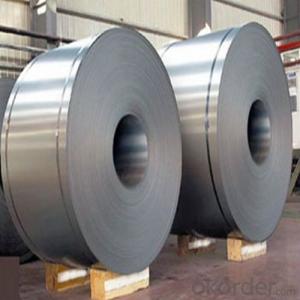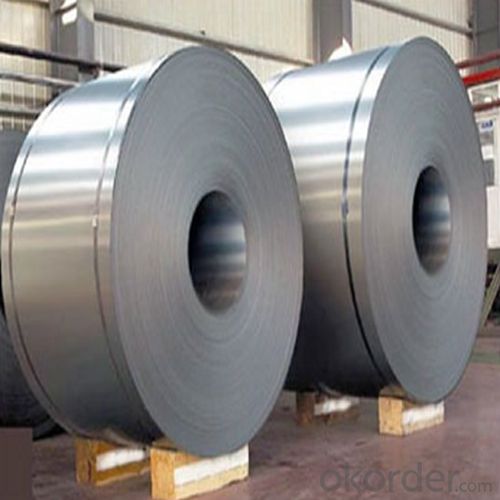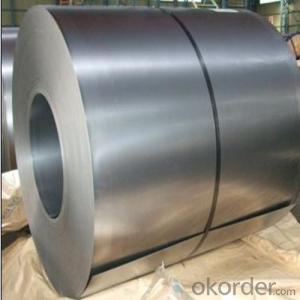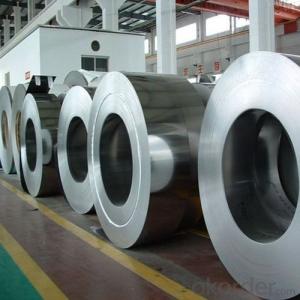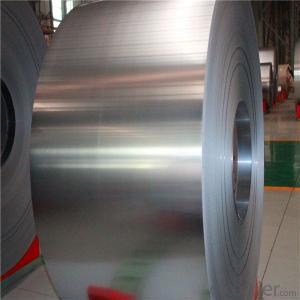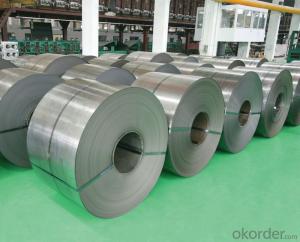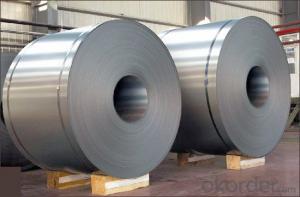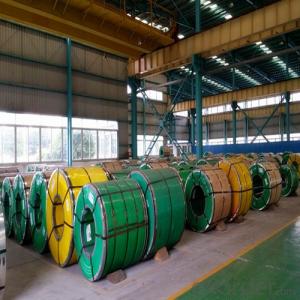Stainless Steel Coil in Hot Rolled Cold Rolled 2B/BA 0.2mm to 1.5mm
- Loading Port:
- Guangzhou
- Payment Terms:
- TT OR LC
- Min Order Qty:
- 100 m.t.
- Supply Capability:
- 5000 m.t./month
OKorder Service Pledge
OKorder Financial Service
You Might Also Like
1.Structure of Hot Rolled Stainless Steel Coil 2B/BA:
Stainless steel coil is a production which not easy rust, acid resistance and corrosion resistance, Stainless steel coil is a new kind of Austenite stainless steel by used Mn, N replace Ni. so it is widely used in light industry, heavy industry, daily necessities and the decoration industry. Stainless steel coil has good corrosion resistance and hot / cold processing performance, instead of stainless steel products for used in the not high of corrosive environment, such as indoor, inland city outdoor etc.
2.Main Features of the Hot Rolled Stainless steel coil:
1) High Quality: Using Latest automated control equipment to ensure the quality
2) Best Price: With most automated equipments to ensure our price is lower than the market
3) Fast Delivery: The delivery date within 20 das after get your order
4) Best Service: Our after-sell service team will help you to slove all the problems about the order
3. 304 Stainless steel coil Images
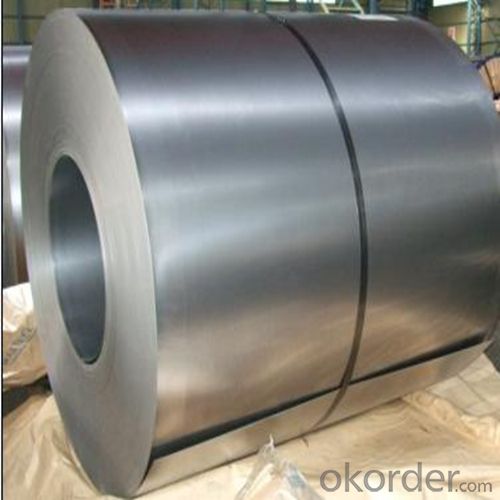
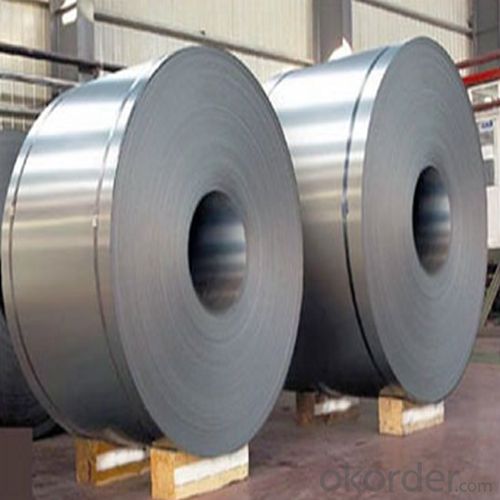
4. 304 Hot Rolled Stainless steel coil2B/BA Specification
Product name: 304 Stainless Steel Coil
Thickness: 0.2mm to 1.5mm
Technical: Cold Rolled
Width: 10mm to 1240mm
Type: 200 Series
Length: As customer's requested
Standard: JIS, SUS
Finish: BA, 2B, 8K, NO.3, NO.4, HL
MOQ: 100 MT
Ship Term: FOB Shenzhen port or CNF import port
Delivery Time: 15 to 20 day after the receive the deposit or LC
Packaging: By wooden pallet, wooden case or according to customer's request
5.FAQ
We have organized several common questions for our clients,may help you sincerely:
1) How about your company?
2) A world class manufacturer & supplier of castings forging in carbon steel and alloy steel,is one of the large-scale professional investment casting production bases in China,consisting of both casting foundry forging and machining factory. Annually more than 8000 tons Precision casting and forging parts are exported to markets in Europe,America and Japan. OEM casting and forging service available according to customer’s requirements.
- Q: How are steel coils used in the manufacturing of agricultural equipment?
- Steel coils are used in the manufacturing of agricultural equipment as they provide strength, durability, and flexibility. These coils are typically formed, shaped, and welded to create various components like frames, brackets, and supports. The high strength of steel allows for the construction of heavy-duty machinery that can withstand the demanding conditions of agricultural operations. Additionally, the flexibility of steel coils allows for customization, enabling manufacturers to produce equipment that meets specific farming needs.
- Q: How are steel coils used in the production of agricultural implements?
- Steel coils are used in the production of agricultural implements as they are typically rolled into specific shapes and sizes to create parts such as blades, tines, and plowshares. These coils provide the necessary strength and durability required for farm machinery to withstand the demanding conditions of agricultural work.
- Q: Will a stainless steel mesh screen scratch a titanium cup, or vice versa?I have a titanium french press and am thinking about replacing the included press with an all steel one. I am worried about little flakes of titanium or steel getting ground off into the coffee when the press slides in and out. The original press has a polyester cloth for a screen, so nothing scratches.
- Will Titanium Scratch
- Q: What are the different types of steel coil edge conditioning methods?
- There are several different types of steel coil edge conditioning methods, including slitting, trimming, deburring, chamfering, and edge rolling.
- Q: PLS tell me all Foam Steel Characteristics and use?Thanks
- Foam steel [often steel foam] is used in applications that require light weight but high rigidity and strength. Watertight doors on modern ships are often made of foam steel. Pressure doors on aircraft are possible uses. As we keep striving for lighter weights in cars, foam steel might have some useful applications in bodies. There is a technical paper online that is in .pdf format that has a good discussion of the process and characteristics of foam steel.
- Q: How are steel coils used in the manufacturing of food packaging?
- Steel coils are commonly used in the manufacturing of food packaging as they provide strength and durability to the packaging materials. These coils are typically shaped into cans, containers, or lids, ensuring the preservation and protection of food products during storage and transportation. Steel coils help maintain the integrity of the packaging, preventing breakage or damage that could compromise the safety and quality of the food.
- Q: What are the different coil packaging options available for steel coils?
- There are several coil packaging options available for steel coils, including wooden crates, steel strapping, steel or plastic banding, shrink wrap, and stretch film. These packaging materials help protect the steel coils during transportation and storage, preventing damage from moisture, corrosion, and shifting.
- Q: What are the common methods of painting or coating steel coils?
- Coil coating is a commonly used technique for painting or coating steel coils. It involves cleaning and pre-treating the coils to remove contaminants and enhance adhesion. Next, a primer or base coat is applied to establish a solid foundation. This primer safeguards the steel against corrosion and enhances the overall durability of the coating. Once the primer is applied, the steel coils undergo a series of rollers to apply the topcoat. The topcoat can consist of various materials such as polyester, polyurethane, or fluoropolymer, depending on the desired properties of the final coating. These topcoats provide the desired color, gloss, and protection against weathering, chemical exposure, and UV radiation. Electrostatic spraying is another popular method for painting or coating steel coils. It involves atomizing the paint or coating material into fine droplets and charging them with electricity. The grounded steel coils attract these charged droplets, resulting in a controlled and even application of the paint or coating material. Powder coating is yet another technique utilized for painting or coating steel coils. It involves electrostatically charging a dry powder and spraying it onto the steel coils. The charged powder adheres to the steel surface due to electrostatic attraction. The coated steel coils are then heated, causing the powder to melt and form a continuous film, resulting in a durable and resistant coating. In conclusion, these methods provide a wide range of options in terms of color, finish, and performance characteristics for painting or coating steel coils. The choice of method depends on factors such as desired appearance, level of protection required, and specific application requirements.
- Q: what is the refining process doing to raw materials in steel
- Refining process for steel include burning out the extra carbon and impurities with oxygen lancing and protecting the steel from atmospheric gas inclusion by protective environment during such process . Measured % of ferralloys are also added to produce various grades of steel . These may be done in induction furnace/ laddle refining furnace / crucibles converters etc.
- Q: What is the standard weight of steel coils?
- The standard weight of steel coils can vary depending on the specific type and dimensions of the coil. However, in general, steel coils typically range in weight from a few hundred kilograms to several metric tons. The weight of a steel coil is primarily determined by its thickness, width, and length. Various industry standards and specifications exist to guide the manufacturing and trading of steel coils, which also include guidelines for determining the appropriate weight range for specific coil sizes.
Send your message to us
Stainless Steel Coil in Hot Rolled Cold Rolled 2B/BA 0.2mm to 1.5mm
- Loading Port:
- Guangzhou
- Payment Terms:
- TT OR LC
- Min Order Qty:
- 100 m.t.
- Supply Capability:
- 5000 m.t./month
OKorder Service Pledge
OKorder Financial Service
Similar products
Hot products
Hot Searches
Related keywords
